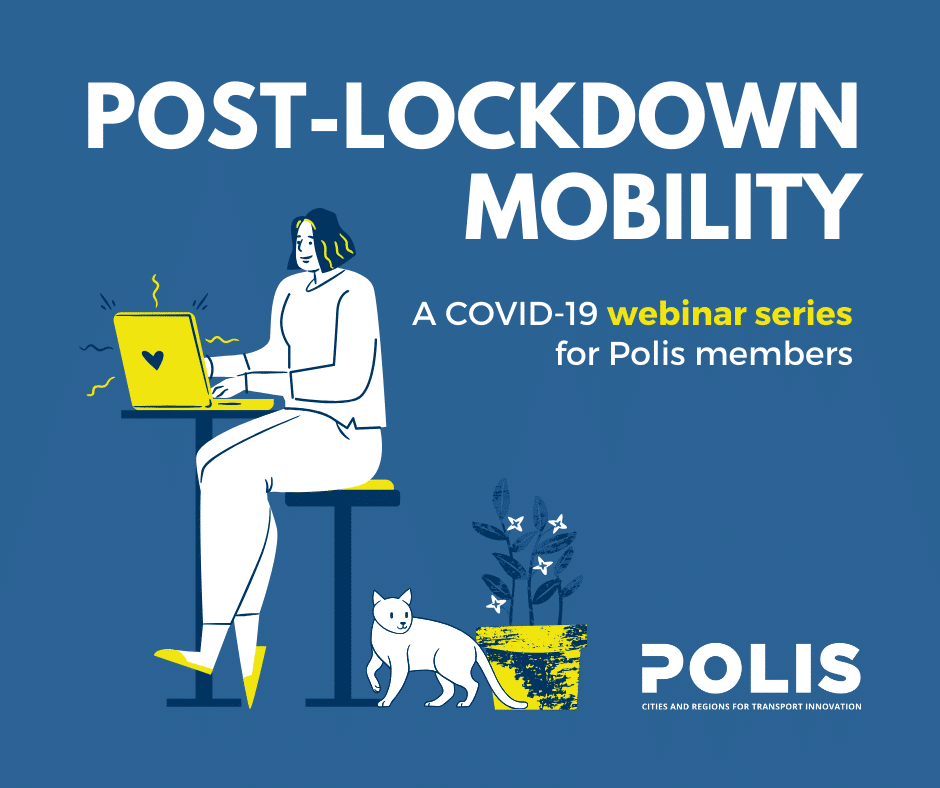Post-Lockdown Mobility report: Bikesharing in the aftermath of COVID-19: A new pillar of public transport?
The session was hosted by Karen Vancluysen, Secretary General of POLIS Network. We were delighted to host this webinar in collaboration with Cycling Industries Europe. Unlike previous webinars, this session saw an interactive panel discussion with five expert guests. Bikesharing has endured some challenging situations during COVID-19, but has also seen increased use in certain cities. With public transport facing reduced capacity in the coming months, an opportunity now exists for bikesharing to stand as the ‘fourth pillar’ of public transport alongside buses, trams and metros.
Why is bikesharing so important to make cycling more popular and more important for cities?
Kevin Mayne, CEO, Cycling Industries Europe
The reduced availability of public transport has exposed how many people in cities do not have access to cars. This raises the question of what alternatives can be used to help get people where they need to go. In this crisis, bikes have come into their own, with a huge step forward in the political understanding of the importance of cycling, in particular for physical and mental health. One of the key remaining barriers to getting more people cycling is access to bikes. Particularly for those on low incomes, the upfront costs of purchasing a bike can be prohibitive. Bikesharing can therefore offer more affordable access to cycling, with flexible pricing options (e.g. daily rates, season passes). These prices can also be managed to achieve social goals, for example offering discounted travel for low-income groups. Kevin highlighted how it is now a public policy decision in terms of how cycling can play a role as a form of public transport in our cities. With roughly 100 million Europeans in urban areas not having access to bikesharing at present (and being told not to use public transport), there is huge potential to expand bikesharing to provide affordable and sustainable public transport to a wider range of people.
What has the impact of the lockdown been on bikesharing and how is it looking now? How has the industry responded during and after lockdown?
Martin Lefrancq, Smart Mobility Coordinator, Brussels Capital Region
 The impact on bikesharing appears to have varied significantly in each city. In Brussels, some operators have increased their ridership, whereas others have pulled out all together. Brussels Municipality has been in touch with certain operators to try to offer support and achieve a cooperative response to this crisis. Some operators have supported the recovery in Brussels by providing their vehicles free of charge to essential workers. The city’s public docked bikeshare scheme remained in operation throughout the crisis, but saw a huge decrease in its use. Compared to what has been seen in other cities, the recovery of the public bikesharing scheme is taking some time.
The impact on bikesharing appears to have varied significantly in each city. In Brussels, some operators have increased their ridership, whereas others have pulled out all together. Brussels Municipality has been in touch with certain operators to try to offer support and achieve a cooperative response to this crisis. Some operators have supported the recovery in Brussels by providing their vehicles free of charge to essential workers. The city’s public docked bikeshare scheme remained in operation throughout the crisis, but saw a huge decrease in its use. Compared to what has been seen in other cities, the recovery of the public bikesharing scheme is taking some time.
Carlos Mateo, Mobility Services Director, EMT (Madrid)
At the start of lockdown in Madrid, the decision was taken to adopt a precautionary approach and close the public ‘BiciMAD’ bikesharing scheme. Once further information was available on how to enhance the safety of bikesharing from a hygiene perspective, the BiciMAD scheme was gradually re-opened, with a strict disinfection regime put in place. In the first phase of reopening in Madrid, BiciMAD saw its use increase by 10% compared to pre-lockdown conditions. Whilst bus use is down by around 40% and car use by 60%, bikesharing appears to be thriving, with levels now roughly 5% above pre-lockdown conditions. Carlos highlighted that cycling is now being considered an alternative for bus and car use, and the main mode of transport for many people.
How did private operators respond?
Pietro Peyron, International Business Development Manager, nextbike
Nextbike operates in 25 cities across Europe and has thus faced big challenges in adapting to the various conditions in each country and city. Operations were stopped altogether in some places, whereas in other cities bikesharing became a key mode of travel. nextbike employees were trained to implement health and safety measures. Once safety routines were established, nextbike began to think strategically about how they could support cities in recovering from COVID-19. New vehicle stations were added in German cities and free bikesharing was offered in some cases to support essential journeys. Pietro noted that the current situation has highlighted how important it is to have a close relationship with municipalities to understand their needs. nextbike was well positioned to adapt due to their flexible business model and cooperated with cities to create integrated bikesharing services with public transport.
Alexander H. Frederiksen, Chief of Sales & Partnerships, Donkey Republic
Donkey Republic has experienced a similar scenario to nextbike. Cities have responded in a variety of ways, and Donkey  Republic has been making the case that bikes are important for urban mobility both during and after lockdown. Cities in Germany and the Netherlands subsidised services to ensure that citizens could access bikesharing for free, whilst other cities did not want to engage at all. Donkey Republic offered free access to essential workers to support cities in the recovery from COVID-19. The ‘visitor’ segment (e.g. tourists) of Donkey Republic’s customers completely disappeared, but the ‘membership’ and ‘commuter’ groups grew rapidly as people sought an alternative to public transport. Donkey Republic offered a ‘corona membership’ where people could keep bikes for up to seven days, helping to address concerns about hygiene. The company also offered to roll out their bikesharing scheme in new cities in one month, which has triggered conversations with cities all over the world.
Republic has been making the case that bikes are important for urban mobility both during and after lockdown. Cities in Germany and the Netherlands subsidised services to ensure that citizens could access bikesharing for free, whilst other cities did not want to engage at all. Donkey Republic offered free access to essential workers to support cities in the recovery from COVID-19. The ‘visitor’ segment (e.g. tourists) of Donkey Republic’s customers completely disappeared, but the ‘membership’ and ‘commuter’ groups grew rapidly as people sought an alternative to public transport. Donkey Republic offered a ‘corona membership’ where people could keep bikes for up to seven days, helping to address concerns about hygiene. The company also offered to roll out their bikesharing scheme in new cities in one month, which has triggered conversations with cities all over the world.
Is there a difference in flexibility between public and private schemes?
Martin Lefrancq
Public schemes are typically harder to adapt as rules and agreements attached to contracts mean that it is hard to respond quickly. It can be challenging to change these contracts. However, in the current situation, more flexibility is starting to be seen on this now. It has triggered a new focus and will for partnerships between the public and private sector for mobility. However, many regulations and barriers still exist to subsidising privately operated free-floating bikesharing, or rather certain trips. Bikesharing integrated as part of Mobility as a Service (MaaS) is still very early in development, and further work is needed to better integrate bikesharing with other modes.
Carlos Mateo
Madrid only had one competitor which used free-floating bikes, but BiciMAD dominates the market in Madrid. The municipality made the decision to allow more free-floating operators, although these can only operate with e-bikes. More operators are expected to launch in Madrid throughout the summer.
Are different business models needed for bikesharing?
Kevin Mayne
Speed will be key in adapting to new conditions. Public transport is in a crisis, and many people are yet to return to the office who will not want to use public transport. A long-term outlook for how these people will get to work and how we can build capacity is needed. Everyone is struggling just now: private operators need to rebuild their finances/security, and municipalities are facing challenges with keeping cities moving. There is now a huge opportunity to work together for the benefit of everyone.
Alexander Frederiksen 
The normal approach for public-private partnerships is not ideal and there is room for improvement. We need to look at different ways to subsidise bikesharing where necessary. Subsidies for specific groups or services could help to achieve certain social or environmental goals. This is ultimately a shared problem for cities and for operators, and these groups must come together to solve this. Cities need to be allowed to choose new operators when they’re not happy with the ones they have, which will require more flexible governance.
Pietro Peyron
Every challenge brings an opportunity. Flexibility in models, operations and partnerships will be important in the coming months and years, particularly for partnerships. On business models, the best approach is to design a model based on the size and type of city. Different models will work better or worse in different locations.
Alexander Frederiksen
What is frustrating when talking to small and medium-sized cities (SMCs) is that there is often a reluctance to pay for bikeshare, even though subsidies and support for public transport is often high. If we start to see bikesharing as the fourth pillar of public transport, then we need to see a shift on this.
Kevin Mayne
This is now a very different scenario and there has been a massive on-the-ground shift in attitudes and recognition of bikesharing. With the huge public transport capacity drop, cities need to get people on bikes. It may in fact be easier for smaller cities who haven’t yet had a bikesharing scheme to now implement one. This may not work everywhere, but there is huge potential for this.
Public schemes are usually docked, whereas private schemes are typically dockless. Is there a preference?
Martin Lefrancq
Both have a societal cost and neither is perfect. Docked schemes have a business model based on advertisement and often use advert boards which take up space. Dockless schemes have challenges too, particularly for street access and parking. Noone knows exactly what is the best solution. Perhaps there is a need for some hybrid system where the people who put back bikes into docks get some incentives, but bikes can also be left dockless? This needs to be explored in more detail.
Alexander Frederiksen
There is a big difference between docked and dockless schemes. When a city has limited streetspace, building two separate infrastructure systems (i.e. docked and dockless) is a waste of space. There is no perfect solution yet, but we should find a way to have shared docking systems for operators. Alexander is optimistic about the willingness from cities to find solutions to these challenges.
Members can watch this session on-demand through our Members Area (login required). To find out more about the Post-Lockdown Mobility series, please see here.




